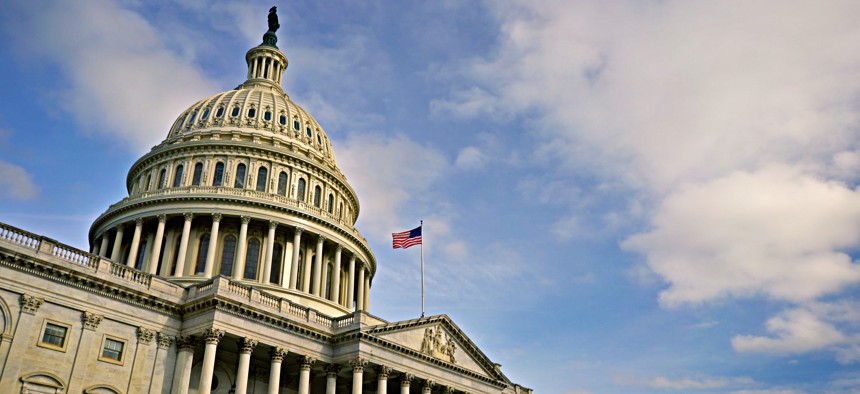Despite debt deal, GOP House looks to cut spending to below last year’s levels

Mikhail Makarov/ Getty Images
An appropriations subcommittee bill would reduce federal spending on housing and transportation by one-fourth.
Saying they are aiming to reduce wasteful and excessive spending, House Republicans are pushing to slash or eliminate 19 federal grants to state and local governments for housing and transportation.
The move is at odds with the debt deal struck in June that called for keeping spending the same. Instead, Republicans on a key appropriations subcommittee passed a bill Wednesday night would reduce federal spending on housing and transportation by one-fourth.
Among the grants at risk of being cut in the upcoming budget negotiations are those that provide funding to state and local governments for affordable housing, to encourage zoning changes that create more housing, for public transit and for the removal of lead paint from low-income housing.
The proposal would completely eliminate so-called RAISE (Rebuilding American Infrastructure with Sustainability and Equity) grants, which were known as TIGER grants during the Obama administration and BUILD grants under the Trump administration. RAISE grants funded 166 transportation projects last year—nearly two-thirds of them in historically disadvantaged communities or areas with persistent poverty.
The proposal would also provide no funding for so-called Mega grants because Republicans said in a fact sheet that Democrats “overfunded” the program last year. The program spent $1.2 billion on projects like building new rail tunnels under the Hudson River between New York and New Jersey, improving a thoroughfare called a “corridor of death” in Philadelphia, widening highways used to move freight and evacuate people along the Gulf Coast, and replacing a cloverleaf interchange in Tulsa.
Rep. Tom Cole, the Republican chairman of the subcommittee that oversees housing and transportation funding, said that the spending proposal would maintain funding for most housing and transportation programs, including the highway trust fund and rental assistance. But by making the cuts, Cole of Oklahoma said the GOP is pushing to “reduce spending and get our debt under control” by focusing spending on “our most critical transportation and housing needs.”
Democrats and President Joe Biden have indicated they will not go along with the cuts. Rep. Mike Quigley, the subcommittee’s top Democrat, said the bill “sets America back in a time we need to move forward.”
But as Michael Wallace, head of federal advocacy on housing and economic development issues, explained in a recent blog post, there’s an incentive on both sides to reach a compromise. Under the debt ceiling agreement, all programs whether they’re supported by Democrats or Republicans, would be cut by 1%—something both sides would likely try to avoid. It remains to be seen, though, what they are willing to agree to.
Among the proposed cuts opposed by Democrats is one that would slash $1 billion from the federal government's main grant program to help states and cities build more affordable housing. The cut would leave the HOME Investment Partnership with half of its original budget—just $500 million.
The proposal takes aim at several other of the Biden administration's housing initiatives as well, including eliminating the Choice Neighborhoods program and cutting $100 million from the U.S. Department of Transportation’s Thriving Communities program. The former program created more than 2,300 new housing units by replacing aging HUD-assisted housing with mixed-income housing.
Meanwhile, the cut to the Thriving Communities program is significant for cities. Created in the 2021 infrastructure law, the program looks to add housing and make transportation improvements around transit stations to revive economically distressed areas. The cut would come at a time when many cities are in the midst of improving transportation options, such as adding light rail, extending bike paths or revitalizing a rural main street.
The GOP bill also looks to eliminate $85 million aimed at addressing NIMBY zoning regulations. The “Yes In My Backyard” grants are intended to encourage cities to pass policies like “increasing density, reducing minimum lot sizes, creating transit-oriented development zones, streamlining or shortening permitting processes” and expanding areas where multifamily housing is allowed.
Republicans in the fact sheet on the bill criticized the zoning provision, saying that the grants “give bureaucrats in Washington the power to change local zoning laws.”
Republicans also go after several rail programs, including eliminating the $560 million Federal-State Partnership for Intercity Passenger Rail program, according to a Democratic fact sheet. Along with expanding passenger service, the grants can also be used for projects that improve the safety, reliability and performance of intercity passenger rail services, and for planning activities, such as environmental review and final design.
According to the American Public Transit Association, the proposal would cut funding for transit by $2.3 billion or by 11%. Nearly all of that, $2.2 billion, would be cut from Capital Investment Grants, slashing funding for the program by half.
In addition, the proposal would cut funding for Amtrak by 64% including funding for the Northeast Corridor by 92%.
“The funding levels outlined in this bill would require deep cuts to train service across the entire network—on the Northeast Corridor, state-supported and long distance services,” said Jim Mathews, president and CEO of the Rail Passengers Association, in a statement. It would, he added, “threaten the complete elimination of some routes.”
Kery Murakami is a senior reporter for Route Fifty, covering Congress and federal policy. He can be reached at kmurakami@govexec.com. Follow @Kery_Murakami
NEXT STORY: Child care costs would fall for low-income families under new rule in government program






